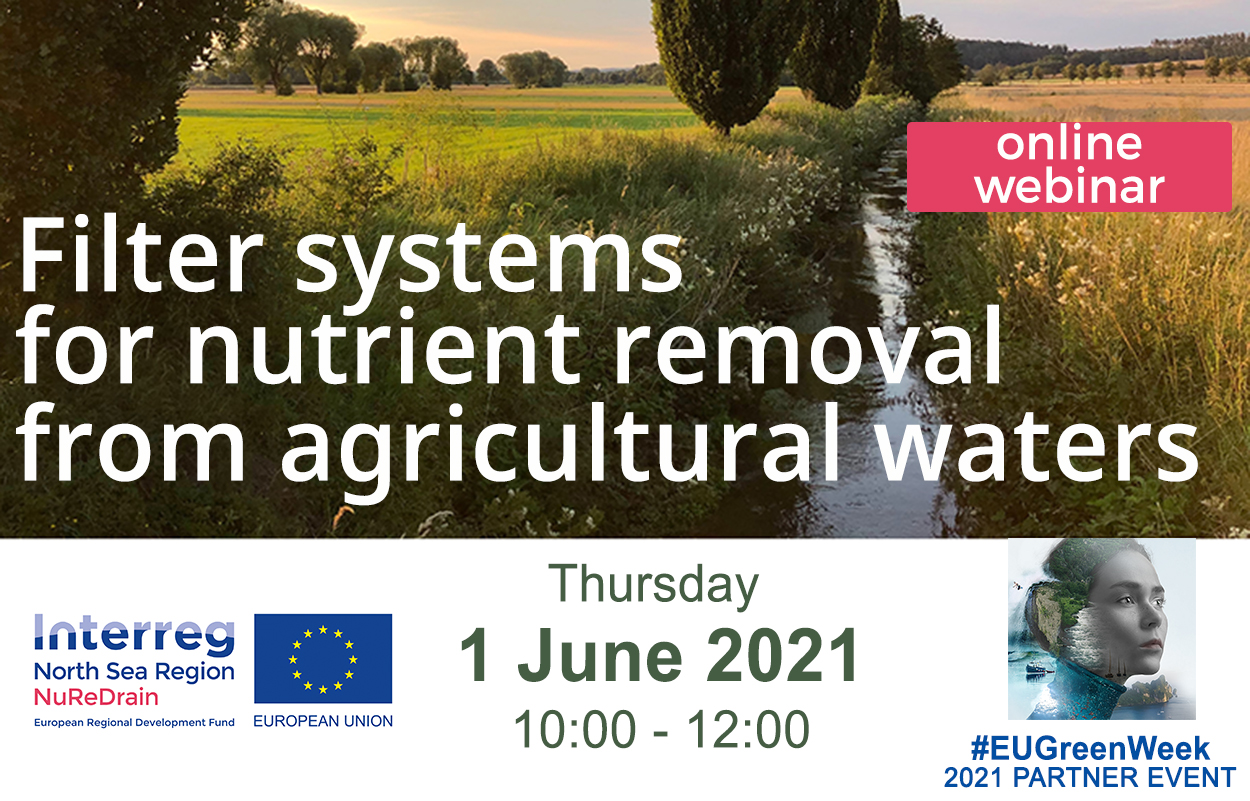Virtual conference: How to filter nitrogen and phosphorus from agricultural water
Join a virtual conference organised by NuReDrain. Here you will meet a number of exciting speakers from, among others, Aarhus University, the University of Copenhagen, Ghent University and Rostock University. With a focus on the latest knowledge, they will talk about filter systems to best prevent nitrogen and phosphorus from being leached through drains into streams and rivers, as well as what positive impact filter systems can have on water quality in a drainage area. And is it possible to recycle the nutrients that are filtered from the water?

With partners in Belgium, Denmark, and Germany, the Interreg Northsea regional project NuReDrain has focused on how filter systems can reduce leaching of nutrients from agricultural soil. Now the project partners will present their results at a conference webinar on June 1, as part of the European Green Week 2021.
Continued high concentrations of nitrogen and phosphorus in surface water
Although preventive measures and policies have been introduced, the concentration of nitrogen and phosphorus in the surfacewater on agricultural land is still very high in regions characterised by intensively cultivated agricultural land.
"It can cause algae blooms in our streams and rivers, even in the sea. And it can be harmful to plants, animals and also to us humans, ”explains academic Lorenzo Pugliese from the Department of Agroecology at Aarhus University.
NuReDrain - "Nutrient Recovery from Drainage Water" - has over the past few years carried out laboratory and field trials with various filters and filter materials for collecting nitrogen and phosphorus from agricultural water.
Trials in three European countries
The project partners have carried out trials in Belgium, Denmark, and Germany with a number of different filters:
- reed fields
- “moving bed bioreactor”
- phosphor filters with iron and aluminum sludge granules or other filter materials
- "zerovalent iron" filter to remove nitrogen and/or phosphorus
"Some of the studies done by our Belgian partners showed that on average we can capture between 60-85% of the nutrients by using these filters," says Lorenzo Pugliese.
Recycled as fertilizer
In addition to testing and improving the filter systems, the researchers also investigated the possibilities of reusing the recycled phosphorus as fertilizer. It turned out, however, that the saturated materials could not be recycled directly. However, by using a chemical treatment, the researchers succeeded in making 40% of the adsorbed phosphorus recyclable.
Investment and operating costs
An important part of the project, and one of the topics for the final conference webinar, is the estimated investment and operating costs of the tested filter systems. As part of the project, the researchers have compared the cost-effectiveness of the various filters and compared them with the current targets for leaching from the field's surface and drainage water.
Join the conference webinar for free
As a conclusion to the project, NuReDrain is organising a conference webinar where all European stakeholders and other interested parties have an unique opportunity to be updated on the latest research results and main conclusions.
The conference, which is virtual and therefore takes place online, is free to attend, but registration is required. You can sign up here.
Read more about the conference on June 1, 2021 here.
| Additional information | |
|---|---|
| We strive to ensure that all our articles live up to the Danish universities' principles for good research communication(scroll down to find the English version on the web-site). Because of this the article will be supplemented with the following information: | |
| Collaborators: | NuReDrain is an Interreg North Sea Region project with partners from Aarhus University, University of Copenhagen, Ghent University, KU Leuven, Vito, Rostock University, InAgro, Landwitschaftskammer Niedersachsen, PCS - proefcentrum voor sierteelt, de Watergroep and Oldenburgische-Ostfriesische Wbandband |
| Funding: | Interreg North Sea Region |
| About the project: | Plants need nitrogen and phosphorus to grow, and fertilizers are full of just that. Therefore, the farmer fertilizes his fields and the crops on them. The part of the nitrogen and phosphorus that is not absorbed by plants is leached to the nearby streams. When the nutrients are leached to the aquatic environment, there is a risk of harmful growth of algae. Ultimately, the increased plant growth will cause a lack of oxygen in the aquatic environment. Not only does leaching cause damage to the aquatic environment, but it can also reduce the quality of our drinking water. Therefore, a lot of money is spent on purifying the water thoroughly before it can be drunk by humans. The NuReDrain project has tested innovative filters that can capture nitrogen and phosphorus before it is leached to the aquatic environment. In the project, experiments have been made with different types of filters, just as investment and operating costs have been calculated. Last but not least, the project partners have investigated whether it is possible to reuse the collected nutrients in the field as fertilizer. |
| Read more: | You can read about the NuReDrain project here. |
| Contact: | Academic staff member Lorenzo Pugliese, Department of Agroecology, Aarhus University. Tel .: +45 87157846. E-mail: lorenzo.pugliese@agro.au.dk Associate Professor Goswin Johann Heckrath, Department of Agroecology, Aarhus University. Tel: +45 51435035. E-mail: goswin.heckrath@agro.au.dk |
